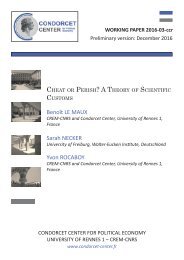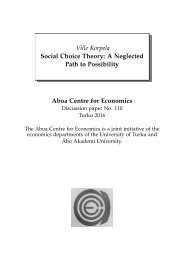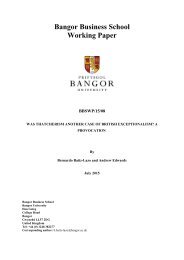MEMORANDUM
n?u=RePEc:hhs:osloec:2016_018&r=hpe
n?u=RePEc:hhs:osloec:2016_018&r=hpe
Create successful ePaper yourself
Turn your PDF publications into a flip-book with our unique Google optimized e-Paper software.
European man.” A vote was taken over proposals put forward and Schumpeter won<br />
handsomely over Gustav Cassel and Edwin Cannan. 188<br />
Schumpeter’s erudition, charisma and social skills made an impact on Harvard leaders,<br />
not least President Lowell and the new economics department chairman Harold H. Burbank.<br />
They were concerned about finding a way of luring Schumpeter back to Harvard. The<br />
sudden death of Allyn Young at 53 years of age in 1929 led President Lowell to offer<br />
Schumpeter a chair at Harvard. Schumpeter knew how to play his hand and suggested to<br />
President Lowell that he could meet Harvard halfway, enabling “…me to take some share<br />
in Harvard’s great work whilst keeping up part of my duties here”. Burbank then took over<br />
and offered Schumpeter to have a visiting position for half a year every year, an offer<br />
which Schumpeter agreed to. Under mild pressure from the Prussian Ministry of Education<br />
which supervised the Prussian universities Schumpeter did not go to Harvard in 1929 but<br />
came for the fall term 1930. After Schumpeter’s failure in getting a chair in Berlin he<br />
approached Harvard about a permanent position. After some negotiation the outcome was<br />
that Schumpeter moved permanently to Harvard. 189<br />
Thus at the time of Schumpeter’s letter to Leontief in October 1931 quoted above,<br />
Schumpeter was still hoping to get the chair in Berlin and hoped that Leontief was heading<br />
for a career in Germany after his fling with Harvard.<br />
When Leontief wrote to Schumpeter again on the middle of December, he was at<br />
Harvard on his second visit. He could tell Schumpeter that it had been decided that he<br />
would address the Harvard Economic Seminary in the spring term. He had decided on the<br />
title, “Positive and Normative Approaches in Economic Theory,” and worked on it in a<br />
history of economic thought perspective. It had been suggested to him that the lecture<br />
could be published in the Quarterly Journal of Economics. 190 He would speak about his<br />
current research in a separate lecture, he referred to it as “elasticity matters”<br />
(Elastizitätsangelegenheit),<br />
Leontief emphasized again that he liked to be at Harvard, comparing it with his<br />
impression of Columbia University which he had visited a couple of times. At Columbia<br />
he had found the ambience strange and unsympathetic while at Cambridge he had felt<br />
comfortable and secure. 191 But Leontief also vaguely felt Harvard that nurtured some farreaching<br />
intensions involving him. At the visit in December 1931 he heard rumors that<br />
188 Swedberg (1991, p.23).<br />
189 See McCraw (2007, pp.193ff).<br />
190 Leontief to Schumpeter, 15 December 1931, transl by ob. The seminar lecture was given (in<br />
March 1932) but it does not seem to have been published.<br />
191 Leontief to Schumpeter, 15 December 1931, transl. by ob. The difference in mood at Harvard<br />
and Columbia was well known: “…Columbia was impersonal and not very collegial in character.<br />
Faculty and students did not socialize much. One does not get the feeling … that creating a band of<br />
faithful followers was ever part of the Columbia ideal.” (Rutherford 2004, p.70).<br />
81





